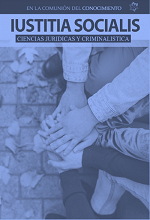Reduction of remuneration and working hours due to health emergency
DOI:
https://doi.org/10.35381/racji.v5i3.1100Keywords:
Derecho constitucional, derecho al trabajo, derechos humanos, servicio de utilidad pública, desigualdad social.Abstract
The objective of the research is to analyze the reduction in pay and working hours due to health emergencies in Ecuador. It was developed from a documentary descriptive methodology with bibliographic design, performing an archiving of documents on the web. As a result of the reduction in wages, the crisis increases since wages fall and yet the basic basket, services, and the needs for protection products, biosecurity do not decrease, nor do taxes, rates or contributions that must be paid, the state before taking decisions to reduce wages should analyze the economic situation of the country in order to develop a correct solution without drastically affecting the socioeconomic condition of people, being able to lead an integral life and respecting the right of SUMAK.
Downloads
References
Código del trabajo. Registro Oficial Suplemento 167 de 16-dic-2005. Última modificación: 26-sep-2012. Recuperado de https://n9.cl/z3p5n
Guarnizo-Campoverde, K., Narváez-Zurita, C., Erazo-Álvarez, J., & Trelles-Vicuña, D. (2020). Vulneración del derecho al trabajo de los servidores públicos por el Decreto Ejecutivo 813. [Violation of the right to work of public servants by Executive Decree 813]. IUSTITIA SOCIALIS, 5(2), 483-510. http://dx.doi.org/10.35381/racji.v5i2.753
Guerra, P., Viera, D., & Beltrán, D. (2020). La Desigualdad de las cargas laborales frente al COVID-19. [The Inequality of workloads against COVID-19]. CienciAméRica, 9(2), 244-250. http://dx.doi.org/10.33210/ca.v9i2.313
Inza-Bartolomé, A. (2015). La inversión social como respuesta a los Nuevos Riesgos Sociales. [Social investment as a response to New Social Risks]. Revista mexicana de sociología, 77(3), 385-406
Molina-Díaz, E, & Regalado-Florido, E. (2017). Relaciones China-América Latina y el Caribe: por un futuro mejor. [China-Latin America and the Caribbean Relations: for a Better Future]. Economía y Desarrollo, 158(2), 105-116.
Oleas, D. (2020). MIES expone las acciones y retos del impacto social en Ecuador ante la emergencia sanitaria por el covid-19 junto a la OCDE. [MIES exposes the actions and challenges of the social impact in Ecuador in the face of the health emergency caused by covid-19 together with the OECD]. Recuperado de https://n9.cl/7hkwi
Organisation for EconomicCo-operation and Development (OECD, 2020). Impacto financiero del covid-19 en Ecuador: desafíos y respuestas. [Financial impact of covid-19 in Ecuador: challenges and responses]. Making Development Happen Volume 6. Recuperado de https://n9.cl/p61gb
Paredes, P. (2020). Gobierno enfrenta cuatro retos económicos hasta fin de año. [Government faces four economic challenges until the end of the year]. Recuperado de https://n9.cl/vbmre
Poveda, L. (2020). ¿Por cuánto tiempo se aplicará la reducción salarial del 16,6% en funcionarios públicos? [For how long will the 16.6% salary reduction apply to public servants?]. Recuperado de https://n9.cl/oyzp
Santillán-Marroquín, W. (2020). El teletrabajo en el COVID-19 [Teleworking in COVID-19]. CienciAméRica, 9(2), 65-76. http://dx.doi.org/10.33210/ca.v9i2.289
Published
How to Cite
Issue
Section
License
CC BY-NC-SA : Esta licencia permite a los reutilizadores distribuir, remezclar, adaptar y construir sobre el material en cualquier medio o formato solo con fines no comerciales, y solo siempre y cuando se dé la atribución al creador. Si remezcla, adapta o construye sobre el material, debe licenciar el material modificado bajo términos idénticos.
OAI-PMH URL: https://fundacionkoinonia.com.ve/ojs/index.php/Iustitia_Socialis/oai










